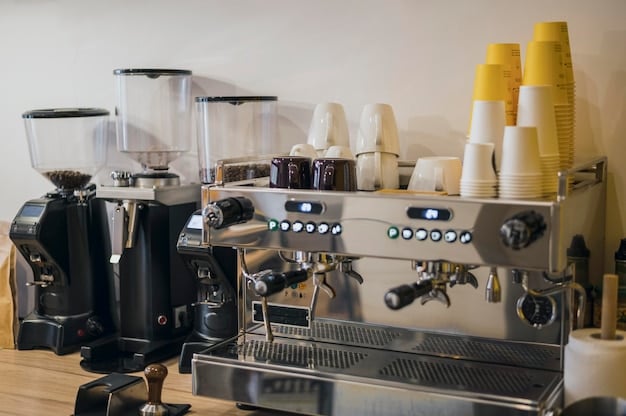Running a coffee shop in 2025 requires more than just brewing skills. Coffee shop owners now face rising supply costs, changing consumer preferences, and fierce competition from established chains.
In San Francisco, David Chen learned this the hard way. His first coffee shop failed within six months because he missed critical equipment and coffee shop supplies needs. “I thought having a good espresso machine was enough,” he says. “I was wrong.” Two years later, his second shop flourished because he mastered the fundamentals of equipment and coffee shop supplies.
Recent data shows that 67% of new coffee shops close within their first year. The main reason? Poor planning for essential coffee shop supplies and equipment. The successful 33% share a common trait: they start with a complete understanding of their supply needs.
This guide covers everything you need to run a successful coffee shop in 2025. We’ll examine:
Modern brewing equipment that increases efficiency by 40%
Sustainable supplies that cut waste costs by 30%
Smart inventory systems that prevent stockouts
Essential barista tools that ensure consistency
New regulations affecting coffee shop operations
Whether you’re opening your first shop or upgrading an existing one, you’ll find practical, tested solutions. Every recommendation comes from successful coffee shop owners and industry experts.
The coffee industry changes fast. What worked in 2024 might not work today. This guide focuses on current market conditions and upcoming trends that will shape your success in 2025.
Let’s start with the most critical equipment decisions you’ll make. To ensure you dont miss any vital items, its beneficial to follow a comprehensive equipment checklist. This helps streamline your purchasing process, avoid last-minute surprises, and guarantee your shop is fully prepared to deliver excellent service from day one. For a complete guide on must-have gear, you can explore the detailed essential coffee shop equipment checklist.
It’s essential to have a thorough and well-structured list to guide your purchases. The Ultimate Checklist for Coffee Shop Equipment outlines everything needed, covering key machines, tools, and supplies that ensure efficiency and quality from the beginning. This checklist is designed to help new and seasoned coffee shop owners avoid common pitfalls and make informed decisions that reflect current industry standards. Reviewing such a comprehensive resource can save you time and money by preventing unnecessary purchases and ensuring readiness for daily operations.
For coffee shop owners seeking to leave no stone unturned, the ultimate guide to assembling the perfect setup is indispensable. This ultimate coffee shop equipment checklist covers everything from grinders to water filters, ensuring your shop runs smoothly from day one. Having such a checklist is crucial to prevent overlooking important supplies that can impact daily operations.
Boost customer satisfaction with just a few clicks
Most-Loved Features:
- On-demand drivers
- Real-time GPS tracking
- Delivery confirmation photos
- Over 50% of customers report a smoother delivery experience
Essential Coffee Shop Supplies for Success
Quality tools are key for top brews.
Eco-friendly supplies meet growing demands.
Efficient inventory is crucial.
Brewing Equipment
Choosing the right brewing equipment is non-negotiable for a coffee shop aiming for excellence. High-quality espresso machines, grinders, and brewers form the backbone of any coffee establishment. These tools not only affect the quality of the coffee but also influence the efficiency with which you can serve customers. Consider the size and capacity of these machines, especially if the coffee shop anticipates high foot traffic. A machine that’s too small can slow down the operation, while one too large might be unnecessarily costly.
Regular maintenance is crucial. Machines often require periodic cleaning and servicing to ensure optimal performance. This is particularly important for espresso machines which can develop issues like scale build-up, affecting both the taste and safety of your coffee. Preventive measures save both time and money and increase equipment longevity.
Sustainable Coffee Shop Equipment
Consumer interest in sustainability has grown tremendously. To succeed in today’s coffee shop industry, offering eco-friendly supplies is almost as important as serving good coffee. Using eco-friendly cups, lids, and straws appeals to environmentally conscious customers and can set your shop apart from competitors.
Reducing plastic usage is not just eco-friendly; it’s a market strategy. Switching to recyclable or compostable materials showcases a commitment to the environment. It’s crucial to assess the available options for cups and cutlery that align with these values. Some coffee shops have successfully integrated these supplies to attract and retain eco-conscious clientele, boosting their brand image.
Inventory Management Tools
Inventory management is the backbone of a profitable coffee shop. Efficient inventory tracking systems are essential to effectively manage stock levels and integrate smoothly with point-of-sale systems. This enables real-time data on supply status, reducing the risk of stockouts or surpluses. Real-time inventory tracking and supplier integration, as demonstrated by efficient systems like PAYS POS, offer insight into maintaining optimal stock levels, even helping achieve reductions in inventory costs.
Moreover, advanced systems can optimize ordering, prevent overstocking, and flag items nearing expiration. The introduction of AI-powered tools has shown impressive results.
Whether starting a coffee shop or keeping one thriving, getting the right supplies and systems in place is critical. These essentials address common queries like the necessary supplies, budget considerations, and more. With a focus on quality, sustainability, and efficient management, coffee shop owners are well-prepared to meet challenges and seize opportunities in 2025.

2025 Coffee Equipment Trends to Watch
Smart Coffee Machines
Smart coffee machines are making waves in 2025, bringing high-tech solutions to the coffee shop business. These machines integrate seamlessly with apps, allowing remote control for added convenience. Malfunctions can be diagnosed more easily, reducing downtime and ensuring quick service for your customers. One of the standout features is the focus on self-cleaning capabilities, which save time and maintain cleanliness with minimal effort. Energy efficiency is also a growing trend, as manufacturers aim to reduce electricity consumption without compromising performance, helping your coffee shop run smoothly while being environmentally conscious. Smart machines will continue to drive fast service, keeping up with the growing demand for quality coffee and beverages in shops worldwide.
Predictions for the Future
The coffee industry is expected to experience continued growth in 2025, with more shops adopting smart coffee machines and tech-driven solutions. The emphasis on user-friendly technology and automation is clear, offering consistent results and faster service. Innovations in equipment will make operations even more efficient, allowing you to streamline processes while maintaining high standards in coffee quality. As automation expands, drinks will be prepared quickly, ensuring your shop stays competitive in the fast-paced restaurant and cafe markets. More advanced features are on the horizon as technology advances, enhancing the overall customer experience.
Cold Brew Innovations
Cold brew is evolving rapidly. New systems are more compact, making them ideal for spaces where every inch counts. These innovations promise fast service without compromising the rich, smooth taste that coffee lovers crave. Cold brew machines now feature advanced temperature control to ensure each cup is brewed to perfection, every time. Whether you’re serving iced cappuccinos or offering a wide selection of cold beverages, these new systems will help keep your shop ahead of the curve.
Market Outlook
As demand for cold brew grows, shops are adapting by investing in new equipment that caters to this popular trend. Customers are seeking better taste experiences and more convenience, and the market is responding with improved cold brew systems. The trend toward quicker, more consistent brews will allow coffee shops to meet the needs of a growing audience looking for quality and speed in their beverages.
Best Eco-Friendly Coffee Tools for Your Shop
Reusable Filters
Switching to reusable coffee filters is an eco-friendly choice that benefits both the environment and your coffee shop’s bottom line. With millions of disposable coffee cups and filters used daily, making the change to metal or cloth filters can significantly reduce waste. Metal filters offer a cleaner, more sustainable taste, while cloth filters provide a smoother texture but require more maintenance. Regular washing ensures these filters remain effective, helping you keep your shop running efficiently while contributing to sustainability.
Plant-Based Milk Options
With the rise of vegan and health-conscious consumers, offering plant-based milk is becoming a must-have for your coffee shop. Whether you stock almond, soy, oat, or coconut milk, each variety has its unique taste and texture, allowing you to offer a broad selection of options. Oat milk, known for its creamy texture and frothing ability, is especially popular for cappuccinos and other hot drinks. Offering these options not only caters to dietary preferences but also sets your cafe apart in an increasingly competitive market. Consider the accessories needed for proper storage and shelf life to maintain the freshness of these plant-based alternatives.
These eco-friendly options can help differentiate your coffee shop while meeting customer demands for sustainable, high-quality beverages.
Supplementary Information
Key terms sharpen skills in coffee crafting.
Understand rules and enhance customer joy.
Tackle challenges with strong management skills.
Key Coffee Shop Terminologies
Understanding the coffee-making jargon can set you apart in the coffee industry. Knowing terms like “Crema”—the flavor-packed foam on espresso—and “Extraction,” the process of drawing flavor from coffee, can fine-tune your brewing skills. Recognizing which brewing method suits different flavors enriches the customer experience. For instance, some methods accentuate natural sweetness, while others bring out the boldness of coffee.
To simplify the complexities of espresso machines, knowing their basic functions is essential. Machines can vary, but the essence revolves around consistent water pressure and temperature. Grasping these can fix brewing issues or enhance your coffee offerings. Barista training courses and coffee brewing books are excellent resources to deepen understanding.
Regulatory Requirements
Running a coffee shop involves navigating complex regulatory landscapes. Health and safety are priorities. Compliance with health codes ensures customer safety and builds trust. Standards often involve equipment cleanliness, proper food storage, and regular inspections.
Licensing is another critical step. From zoning permits to operational licenses, each region has its own requirements. Failure to comply can result in penalties or business closure. Food safety guidelines also dictate how you handle products, influencing your supply choices. Investing in compliance training and consulting services simplifies these challenges.
Customer Experience Enhancements
Creating a memorable customer experience requires blending environment, service, and product offerings. Howard Schultz noted the importance of building emotional connections by remembering customer preferences. A welcoming ambiance and efficient layout can transform customer flow, improving satisfaction and repeat visits.
Incorporating technology like mobile ordering apps can streamline operations. This not only meets digital-savvy customer expectations but also boosts sales. Offering diverse coffee options satisfies varied preferences and enhances your menu. Personalizing drinks or offering seasonal flavors keeps the experience fresh.
Potential Challenges in the Coffee Shop Industry
Staying ahead of challenges brings longevity to your coffee shop. Coffee bean prices can fluctuate due to climate changes or trade issues; this impacts your pricing strategy. Supply chain disruptions, such as delayed shipments, can cause inventory shortages. Building relationships with multiple suppliers can be a solution.
Emerging trends like plant-based diets or premium coffees demand that you adapt offerings. Missing these opportunities risks losing market share. Constant market research and flexible business models will serve as an ally in adjusting to these changes.
Skills Needed for Running a Coffee Shop
Managing a coffee shop is not just about brewing coffee; it involves a range of skills. Effective team management and customer service can improve both employee satisfaction and customer experience. Building a motivated team reflects on service quality. Choosing the right leadership is as crucial as having the right equipment. Hiring the perfect coffee shop manager can transform your cafe’s atmosphere and ultimately impact your business success. A knowledgeable and approachable manager ensures smooth daily operations, supports your baristas, and enhances customer satisfaction. For those looking for comprehensive tips on identifying and selecting the best fit, exploring advice on how to select the ideal coffee shop manager is highly beneficial.
Selecting the right coffee shop manager is a pivotal decision for any cafe owner. The ideal manager not only brings strong leadership skills but also a deep understanding of cafe operations and customer relations. Their role is essential in creating a positive atmosphere, managing daily challenges, and driving business growth. By focusing on qualities such as effective communication, problem-solving abilities, and passion for the coffee industry, you ensure that your coffee shop runs efficiently and maintains high customer satisfaction levels.
Another key aspect to consider is the role a well-trained coffee shop manager plays in fostering a productive work environment and driving business growth. Selecting someone with strong leadership skills and industry knowledge can lead to improved team dynamics and a better customer experience. Detailed guidance on this topic can help you make an informed choice for your cafe’s future success.
Financial literacy is equally important. Understanding budgets, costs, and profitability equips you to make informed decisions. Investment in training can uplift your team and refine your offerings. Constant learning improves barista skills, keeping up with new techniques and customer expectations.
Conclusion
Starting a coffee shop in 2025 needs careful planning and the right tools. This guide shows you the essentials: from basic brewing equipment to advanced smart coffee machines. Quality equipment, sustainable practices, and strong inventory systems create the foundation for success.
The coffee industry keeps changing. New technology brings better efficiency through smart machines and improved cold brew systems. But the basics remain crucial: precise scales, good milk frothers, and reliable brewing tools help maintain drink quality. Paper coffee cups, coffee stirrers, and coffee cup sleeves will become regular supplies in your shop, ensuring that each cup is served with care and convenience for your customers. Choosing the right point-of-sale (POS) system is also vital for streamlining operations in today’s fast-paced coffee shop environment. A well-integrated POS system can manage sales, inventory, and customer preferences, making processes smoother and more efficient. Learning about the best options available can guide you in selecting a system that fits your needs. For a detailed overview of effective solutions, check out a list of the top 10 POS systems for coffee shops.
Success in 2025 means staying current with health regulations, managing your team well, and keeping up with customer preferences. Focus on both the technical aspects – like maintaining equipment and managing inventory – and the human elements of running your cafe. Offering an extensive selection of baked goods and beverages will help attract customers looking for a variety of choices in your shop. Keep your food packaging simple yet appealing, ensuring easy handling of both hot and warm drinks. An important aspect of enhancing customer appeal is incorporating smart design elements into your coffee shop. A well-thought-out coffee shop design can influence customer flow and encourage longer visits. Consider creating inviting areas for socialization, as well as efficient layouts for baristas to serve quality drinks quickly. You can learn valuable insights on how to attract more customers with effective coffee shop design strategies by visiting an insightful guide on this subject.
To further enhance your coffee shop’s appeal and convenience, consider incorporating delivery services. Offering coffee delivery can significantly expand your customer base and improve sales, meeting the growing consumer demand for convenience in their daily routines.
Adding delivery services to your coffee shop presents a powerful opportunity to capture a wider audience. By offering timely and reliable coffee delivery, you increase accessibility for customers who prefer enjoying their favorite brews at home or work. This modern approach not only boosts your sales but also strengthens customer loyalty, as convenience remains a key factor in their purchasing decisions. To learn more about how effective delivery can expand your business, explore comprehensive advice on optimizing your coffee shop’s delivery services.
Expanding your coffee shop’s delivery services can significantly enhance your market presence. Implementing efficient delivery strategies not only meets customer demands for convenience but also drives higher revenue streams. Leveraging insights from experts on coffee shop delivery can help you navigate challenges like timely fulfillment and maintaining coffee quality during transit. Discover actionable tips and best practices in the detailed coffee shop delivery methods and strategies that can elevate your business operations.
Remember that even with all the right supplies, running a coffee shop needs dedication and attention to detail. Start with the essential equipment we’ve covered, then build your inventory based on your specific needs and customer demands. Make sure to offer a large selection of drinks, and consider all the little touches—like having enough coffee cup sleeves and other accessories—to create a welcoming experience. Your coffee shop’s success depends on how well you combine quality tools with good business practices. Additionally, to tap into a broader customer base, consider integrating delivery services into your business model. Coffee shop delivery has become increasingly popular and can significantly boost your sales volume while providing convenience to your customers. Efficient delivery operations require reliable packaging and coordination with delivery platforms, ensuring that your quality coffee reaches customers fresh and on time. For more detailed insights on implementing delivery services effectively, explore strategies to enhance coffee shop delivery options.
Take the first step: make a list of must-have equipment and browse through your options to start planning your budget today.













